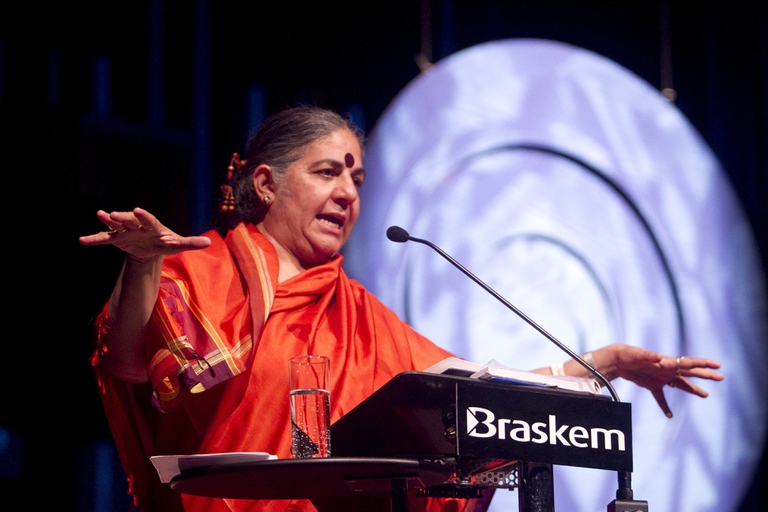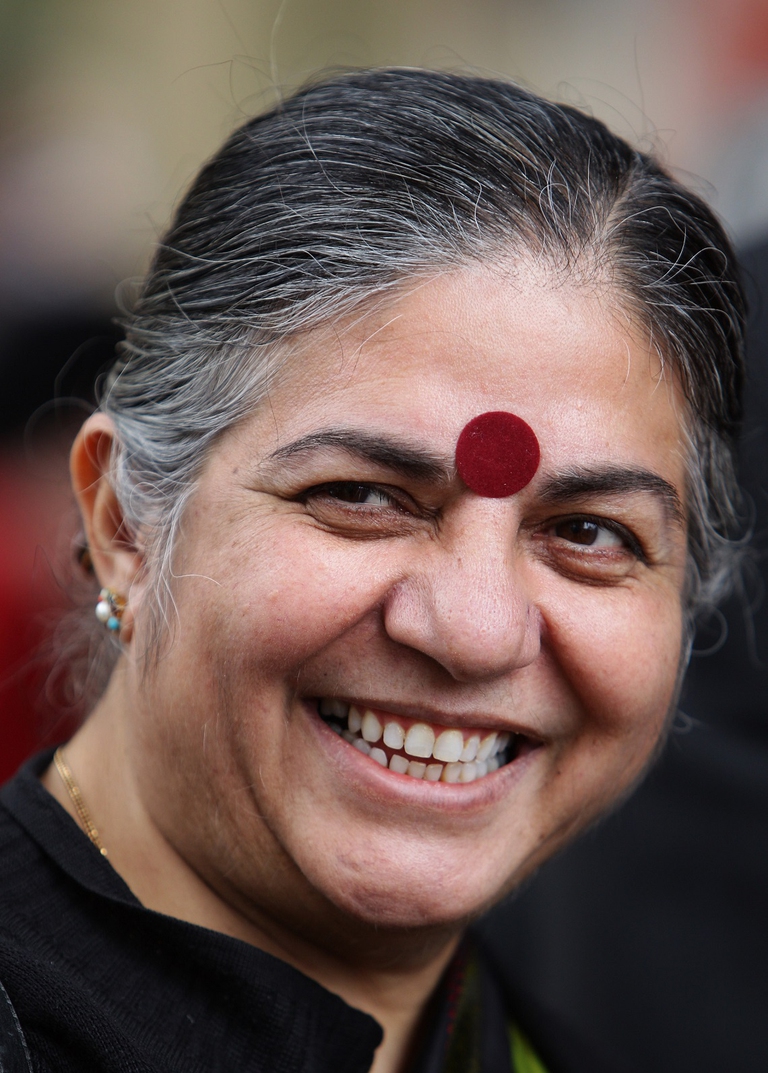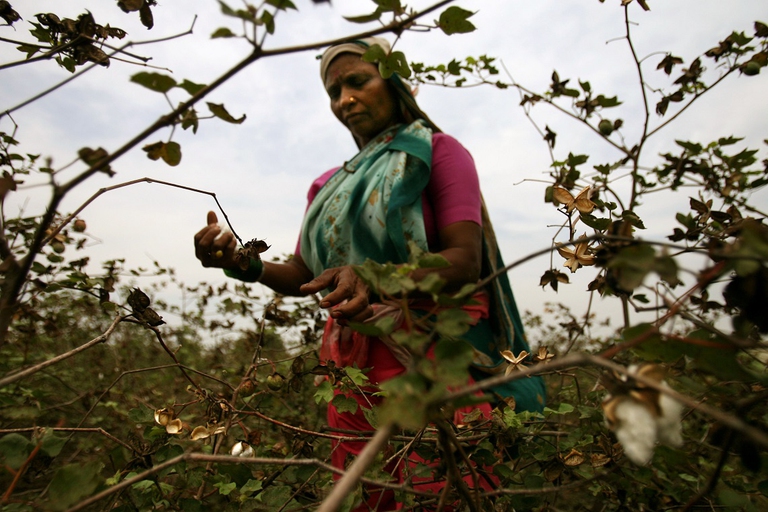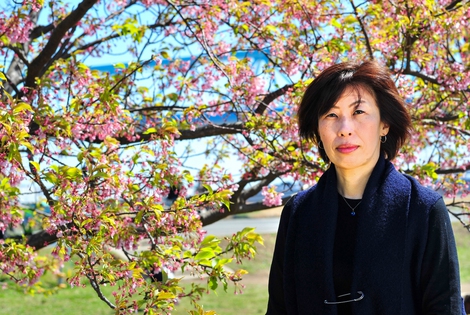
Three people putting the protection of the planet before themselves. Three powerful stories from Latin America, the deadliest region for environmental activists.
Influential scientist, activist and author Vandana Shiva fights to protect biological and cultural diversity, and against GMOs.
In the 1970s, while still in her early twenties Vandana Shiva joined the non-violent women’s group “Chipko” created to stop deforestation in the highlands of northern India. To protect the forests, the women of Chipko would form circles around trees and hug them. Vandana Shiva thus became a “tree-hugger” in the footsteps of Amrita Devi, who three centuries earlier, in 1730, embraced a tree to prevent soldiers sent by the Raja of Jaipur from cutting it down together with the rest of the forest that was home to the Bishnoi community.
Since then, Shiva’s influence has continued to grow and she has become one of the world’s most important activists, “the rock star in the worldwide battle against genetically modified seeds“, in the words of American journalist Bill Moyers. With her proud gaze, motherly smile and unmissable bindi on her forehead, she has come to embody the struggle to protect agricultural biodiversity, which she considers intimately linked to cultural diversity, against the threat posed by multinational corporations and the genetically modified organisms (GMOs) they commercialise. “Cultivating and conserving diversity is no luxury in our times. It’s a survival imperative,” Shiva has stated.
Shiva, who holds a Master’s degree in physics and PhD in the philosophy of science, has recevied an impressive number of awards. In 1993 she won the Right Livelihood Award, also known as the “Alternative Nobel Prize”. In 2003, Time magazine had called her an “environmental hero” and Asiaweek magazine nominated her one of the continent’s five most powerful communicators.
In 1982 she created the Foundation for Science, Technology and Ecology, and in 1987 she founded Navdanya, a movement in defence of food sovereignty, seeds, biodiversity and the rights of small farmers which promotes organic agriculture and fair trade.
Shiva has written numerous books, including “Monocultures of the Mind: Perspectives on Biodiversity and Biotechnology“, “The Violence of the Green Revolution: Third World Agriculture, Ecology, and Politics” and “Biopiracy: The Plunder of Nature and Knowledge”. She is on the boards of a number of organisations, including the World Future Council, International Forum on Globalisation and Slow Food International. In 2004 she founded Bija Vidyapeeth, or the School of the Seed, an international college where, among other things, meetings on organic farming techniques and natural insecticides are held.
Shiva’s work is aimed primarily at the battle against GMOs and agricultural multinational corporations. She began opposing the genetic transformation of seeds in the late 1980s after attending a conference on biotechnology. Biodiversity is the shell of culture, there can be no cultural diversity without biological diversity, she writes in Monocultures of the Mind: we must defend the uniqueness of what we eat and what we use to feed our children. We must defend ourselves from global monoculture.
The activist has travelled the world giving talks on the ethical and ecological impacts of genetic engineering in agriculture. At the core of her work is the idea that seeds must be free and companies can’t have patents on them. She believes that by engineering, patenting and modifying seeds corporations such as Monsanto are trying to impose “food totalitarianism” on the world. She explains how indigenous seeds have been superseded by new hybrids that can’t be reproduced and must be purchased every year at a high price, and that these hybrids are also vulnerable to pests.
Shiva warns that cultivating GMOs damages ecosystems and biodiversity and that such crops harm human health. She also argues that the idea of genetically modifying an organism goes against the laws of nature. “Patents are granted for inventions, and life isn’t an invention,” she has said.
Like Mahatma Gandhi, Shiva questions many of modern civilisation’s basic goals. In particular, she criticises the negative impact of globalisation, which Gandhi also considered fatal for the survival of small local communities. “Globalisation is giving rise to new slavery, new holocausts, new apartheid,” Shiva has said. “It’s a war against nature, women, children and the poor. A war which is transforming every community and home into a war zone. It’s a war of monocultures against diversity, of big against small, of war time technologies against nature”.
Shiva believes that the Western development model isn’t sustainable and that, on the contrary, it creates debt and poverty while altering the balance of nature. In this way, cultures and traditions are being gradually demolished in the name of competition and profit. “What we’re doing in the name of globalisation to the poor is brutal and unforgivable. This is specially evident in India as we witness the unfolding disasters of globalisation, especially in food and agriculture,” Shiva has said.
For Shiva, patriarchal Western industrial civilisation has made the mistake of ousting women from nature, creating a development that in which feminine, conservation and ecological principles are absent. As such, she considers it essential to put women and ecology at the centre of discussions on modern development.
For example, in Shiva’s view Indian women are custodians of traditional knowledge that they’ve gained through centuries of contact with the land. They’re the pillar of rural economies and as such are particularly affected by the exploitation of natural resources, which is a form of violence against women as well as nature.
Shiva plays a key role in the global ecofeminist movement. In 1988 she published the book “Staying Alive: Women, Ecology and Survival,” which helped redefine the perception of women from the Global South and spurred the launching of Diverse Women for Diversity, a worldwide movement in defence of biological and cultural diversity.
Siamo anche su WhatsApp. Segui il canale ufficiale LifeGate per restare aggiornata, aggiornato sulle ultime notizie e sulle nostre attività.
![]()
Quest'opera è distribuita con Licenza Creative Commons Attribuzione - Non commerciale - Non opere derivate 4.0 Internazionale.
Three people putting the protection of the planet before themselves. Three powerful stories from Latin America, the deadliest region for environmental activists.
Kimiko Hirata has blocked 13 new coal plants in Japan, but she hasn’t done it alone. The 2021 Goldman Prize winner tells us about her movement.
The Goldman Environmental Prize, the “green Nobel Prize”, is awarded annually to extraordinary activists fighting for the well-being of the planet.
We talk to Shaama Sandooyea, activist and marine biologist from Mauritius onboard Greenpeace’s Arctic Sunrise ship in the heart of the Indian Ocean.
Arrested for supporting farmers. The alarming detention of Disha Ravi, a 22-year-old Indian activist at the fore of the Fridays for Future movement.
Water defender Eugene Simonov’s mission is to protect rivers and their biodiversity along the borders of Russia, China and Mongolia.
Chibeze Ezekiel, winner of the 2020 Goldman Environmental Prize for Africa, is fighting to guide new generations towards a renewable future.
Leydy Pech, winner of the 2020 Goldman Environmental Prize for North America, is the beekeeper who defended Mexican Maya land against the agro-industry.
Paul Sein Twa, winner of the 2020 Goldman Environmental Prize for Asia, has spent a lifetime defending Karen culture in Myanmar and its synergy with nature.










